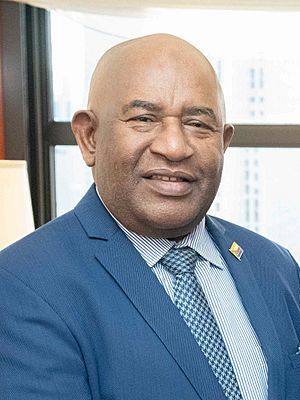Azali Assoumani facts for kids
Quick facts for kids
Azali Assoumani
|
|
|---|---|
|
غزالي عثماني
|
|

Assoumani in 2023
|
|
| 7th President of the Comoros | |
| Assumed office 3 April 2019 |
|
| Preceded by | Moustadroine Abdou (acting) |
| In office 26 May 2016 – 13 February 2019 |
|
| Vice President | Abdallah Said Sarouma Djaffar Ahmed Said Moustadroine Abdou |
| Preceded by | Ikililou Dhoinine |
| Succeeded by | Moustadroine Abdou (acting) |
| In office 26 May 2002 – 26 May 2006 |
|
| Vice President | Caabi El-Yachroutu Mohamed Rachidi ben Massonde |
| Preceded by | Hamada Madi (interim) |
| Succeeded by | Ahmed Abdallah Mohamed Sambi |
| President of the Council of State of the Comoros | |
| In office 30 April 1999 – 21 January 2002 |
|
| Prime Minister | Bianrifi Tarmidi Hamada Madi |
| Preceded by | Tadjidine Ben Said Massounde (acting) |
| Succeeded by | Hamada Madi (acting) |
| 21st Chairperson of the African Union | |
| In office 18 February 2023 – 17 February 2024 |
|
| Preceded by | Macky Sall |
| Succeeded by | Mohamed Ould Ghazouani |
| Personal details | |
| Born | 1 January 1959 Mitsoudjé, French Comoros |
| Political party | Convention for the Renewal of the Comoros |
| Spouse | Ambari Daroueche Assoumani |
| Profession | Senior military officer |
| Signature |  |
Azali Assoumani (غزالي عثماني; born 1 January 1959) is a politician and former military officer from the Comoros. He has served as the President of the Comoros for several terms. He first became the country's leader in 1999 after a military takeover. He was later elected president in 2002, 2016, 2019, and 2024. From February 2023 to February 2024, he also led the African Union, a group of African countries.
Contents
Early Life and Training
Azali Assoumani was born in 1959 in Mitsoudjé, which was then part of the French Comoros. He received his military training at the Meknes Royal Military Academy in Morocco. He also studied at the École de Guerre in Paris, France.
Becoming President
In 1999, Azali Assoumani became the President of the Council of State of the Comoros. He took power after a military takeover. His troops said they acted to protect the country's islands. This happened because the previous leader was talking about giving more independence to the island of Anjouan.
In December 2001, the Comoros adopted a new set of rules for the country, called a constitution. This new constitution changed the country's name to the Union of the Comoros. It also gave more control to each of the Comorian islands. The national flag was also redesigned to be multicolour.
First Presidential Term (2002-2006)
Assoumani announced elections for 2002. He stepped down from his role as President of the Council of State in January 2002 to run for president. He was then elected president with a large number of votes. He officially started his term on May 26, 2002.
During his first time as president, there were some disagreements about how much power the different islands should have. The constitution said that future presidents should come from different islands. Because of this rule, Ahmed Abdallah Mohamed Sambi from Anjouan became president after Assoumani in 2006.
Return to Power (2016-Present)
Assoumani ran for president again in 2016. After two rounds of voting, he was declared the winner. There were some arguments about the results, but a special court confirmed his victory. He took office again on May 26, 2016, for a five-year term. He had several vice-presidents during this time, including Djaffar Ahmed Said, Moustadroine Aboudou, and Abdallah Said Sarouma.
During his time in office, some people accused Assoumani of changing the country's rules to stay president longer. The European Union also stopped working with the Comoros for a while. This happened because some people were worried about his decisions, like closing certain courts.
In February 2019, Assoumani stepped down briefly to run for re-election. He won the election in March 2019 and started his new term on April 3.
He was re-elected for another term as president in the 2024 election. There were some concerns about how the election was run, and some unrest afterward. In August 2024, President Assoumani gave his son, Nour El Fath, more power in the government.
In September 2024, Assoumani was slightly hurt during an incident at a funeral. A soldier was arrested in connection with the incident. In January 2025, the political party led by President Assoumani won most of the seats in the parliamentary election. However, some other political parties did not agree with these results.
International Relations
Azali Assoumani has represented the Comoros on the world stage. In 2022, he was invited to open the 2021 Africa Cup of Nations football tournament in Cameroon. He also met with Japanese Emperor Naruhito during the funeral of Japan's former prime minister, Shinzo Abe, in Tokyo.
In July 2023, while he was leading the African Union, Assoumani attended a meeting in Russia. At this meeting, Russian President Vladimir Putin talked about Russia being a good partner for African countries.
See also
 In Spanish: Azali Assoumani para niños
In Spanish: Azali Assoumani para niños
 | Bessie Coleman |
 | Spann Watson |
 | Jill E. Brown |
 | Sherman W. White |

